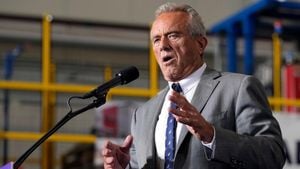Singapore’s DBS Group Holdings Ltd, the largest lender in the city-state, is eyeing potential expansion activities across the causeway, aiming to acquire stakes in Malaysian banks. Two sources familiar with the discussions revealed this strategic move as part of DBS’s broader push to solidify its presence in Southeast Asia. One of the prospects includes acquiring Singapore state investor Temasek's significant 29.1% stake in Alliance Bank Malaysia Bhd, currently valued at around $460 million. Notably, DBS stands out as the only Singaporean bank without retail operations established in Malaysia, unlike its local rivals such as Oversea-Chinese Banking Corporation and United Overseas Bank, both of which have successfully set up shop across the border.
While DBS has confirmed its non-participation in discussing market rumors, the bank's interest aligns with the backdrop of Malaysia's burgeoning economic outlook. The country has recently witnessed promising growth, with its economy growing 5.9% annually during the second quarter, marking its fastest expansion pace in nearly 18 months, driven by increased household spending and various infrastructure investments. This positive economic climate may bolster the prospects of credit growth—an attractive opportunity for potential investors.
DBS’s search for acquisitions isn’t new; under outgoing CEO Piyush Gupta’s 15-year leadership, the bank has heavily relied on mergers and acquisitions as part of its growth strategy, particularly focusing on markets like China, India, Indonesia, and Taiwan. The most recent triumph was the acquisition of Citigroup’s consumer banking business in Taiwan last August, positioning DBS favorably across the region. Recently, Gupta announced plans for potential “bolt-on acquisitions,” which are smaller, strategic purchases aimed at facilitating faster growth without the overhead costs commonly associated with large-scale mergers.
The murmurs of interest from DBS have surfaced just as Malaysia's economic prospects are improving, following the establishment of new projects stimulating credit growth. Back home, Singapore's financial sector has seen substantial investments as DBS continues to flourish, having recorded its highest-ever quarterly net profit, reflecting exceptional fee income growth.
Meanwhile, across the Pacific, the relationship between the European Union and China appears to be under strain. EU officials have openly expressed concerns over trade practices perceived as discriminatory against European companies operating within China. With five years of negotiations failing to yield significant advancements, EU's ambassador to China, Jorge Toledo, has underscored growing frustrations, particularly targeting the procurement process for medical devices.
Toledo's remarks came post-European Union’s investigations concerning Chinese imports, particularly focusing on electric vehicles, which have incited countermeasures by Beijing against EU's pork and dairy sectors. Just recently, new tariffs as steep as 45.3% on Chinese electric vehicle imports went live, signaling rising frictions. The ambassador emphasized this lack of market transparency, stating, "If it is true, and we know it’s true, we will treat Chinese companies in Europe the same way we are treated here." This comment reflects the EU's firm stance on achieving equitable trade practices and transparency.
Such disagreements highlight the precarious balance the EU is maintaining as it navigates potential trade wars. Despite these tensions, EU officials have maintained their desire to avoid full-blown conflict by urging for balanced, reciprocal trade relationships. It remains to be seen how these complex dynamics will evolve as both regions pursue paths amid fluctuated geopolitical landscapes.
DBS’s strategic eye on Malaysia and the EU’s diplomatic maneuvering with China epitomize the current shifts and challenges within international business and trade strategies. Each region’s economic and political climates will undeniably influence the forthcoming decisions made by these financial powerhouses.



